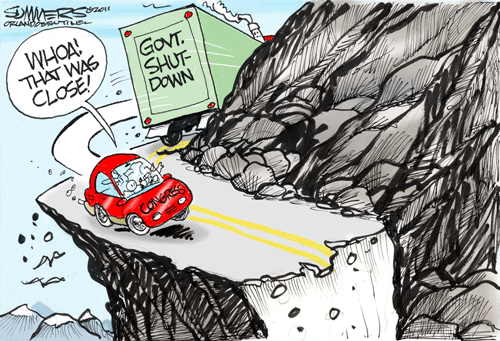Ready or not, here it comes, filibuster reform. Or so says Senate Majority Leader Harry Reid:
WASHINGTON — Keeping with his post-election pledge to reform the filibuster, Senate Majority Leader Harry Reid (D-Nev.) on Tuesday proffered that changes to the rules of the upper chamber will be made, leaving it up to Republicans if they would like to participate. [..]
“There are discussions going on now [over filibuster reform], but I want to tell everybody here. I’m happy I’ve had a number of Republicans come to me, a few Democrats,” Reid told reporters Tuesday at his weekly press availability. “We’re going to change the rules. We cannot continue in this way. I hope we can get something that the Republicans will work with us on.”
“But it won’t be a handshake,” he added. “We tried that last time. It didn’t work.” [..]
Senate Minority Leader Mitch McConnell, who has repeatedly slammed Democratic efforts to reform the filibuster, was unmoved by Reid’s statement.
“Well, there is growing Democratic unease with breaking the rules to change the rules,” McConnell said later Tuesday at his weekly press conference. “I think it will be very difficult for that to come about. I think it will be bad for the Senate.”
McConnell added that in accordance with Senate rules, such an effort would require a 67-vote majority, and that Reid’s approach to make the changes with a simple 51-vote majority — a procedure that has been labeled a “nuclear option” by its opponents — would be “bad for the institution, bad for the country.”
It’s only breaking the rules if the other side does it. Otherwise it is perfectly within the rules on the first day of the new congress.
Sal Gentile, a staff member for MSNBC’s Up with Chris Hayes, writes:
If President Obama wants to get anything done in his second term, Democrats in the Senate will have to overcome one major obstacle: the filibuster.
In the last four years, Republicans have used the filibuster to prevent landmark pieces of legislation-such as the DREAM Act, the Paycheck Fairness Act and additional measures to stimulate the economy-from even reaching the floor for debate, let alone a vote. Republicans have shattered previous records for filibuster use, and the share of bills introduced in the Senate that have been passed has reached an all-time low. [..]
The filibuster has mutated over the years from a quirk of the Senate rules and an obscure procedural instrument-known mostly for so-called “lone wolf” filibusters like the one from the iconic film Mr. Smith Goes to Washington – to a routine impediment to legislative progress, a bludgeon used by the Republican minority to quash virtually any attempt by Democrats to govern. [..]
The proposed changes, which have the strong backing of Senate Majority Leader Harry Reid and nearly 51 Democratic senators, are also broadly endorsed by a wide range of Constitutional scholars and the public at large. A new Huffington Post/YouGov poll released Friday found that 65% of Americans favor tweaking the rules to require senators to debate a bill on the floor if they wish to block it from proceeding.
Even the man responsible for enforcing and administering the rules of the Senate endorsed some of the changes. In an interview on Up w/ Chris Hayes Saturday, Alan Frumin, who served as the parliamentarian of the Senate for nearly two decades until he retired last year, said he supported changes that would forbid senators from filibustering bills before they reach the floor for debate. Frumin also said he favored changes that would bar senators from blocking bills once those bills have passed the Senate and are ready to move to a conference committee with the House. [..]
The filibuster is nowhere mentioned in the Constitution, and many of the Founders argued forcefully against proposals that would have required more than 51 votes to pass legislation in the Senate. In 1788, for example, James Madison, known as the ‘Father of the Constitution,” wrote in Federalist No. 58 that requiring a supermajority in the Senate would “reverse” the “fundamental principle of free government.” Such a policy would empower special interests and make government “oligarchic,” Madison said.
“An interested minority might take advantage of it to screen themselves from equitable sacrifices,” Madison wrote, rather prophetically. “Or, in particular emergencies, to extort unreasonable indulgences.“
Sen. Jeff Merkley, D-Ore., a leading advocate of filibuster reform, joined Up host, Chris Hayes for a discussion on the prospects of filibuster reform in the Senate. Adding the views are panel guests Alan Frumin, former Senate Parliamentarian and author of “Riddicks Senate Procedure;” Akhil Amar, Yale Law School professor and author of “America’s Unwritten Constitution: The Precedents and Principles We Live By;” Victoria DeFrancesco Soto, MSNBC contributor, senior analyst at Latino Decisions and fellow at the LBJ School of Public Affairs at the University of Texas-Austin; and Richard Arenberg, co-author of “Defending the Filibuster: The Soul of the Senate.”

 Apparently the
Apparently the
Recent Comments